- Home
- Joseph Conrad
Complete Works of Joseph Conrad (Illustrated) Page 9
Complete Works of Joseph Conrad (Illustrated) Read online
Page 9
CHAPTER VII.
The bright sunshine of the clear mistless morning, after the stormy night, flooded the main path of the settlement leading from the low shore of the Pantai branch of the river to the gate of Abdulla’s compound. The path was deserted this morning; it stretched its dark yellow surface, hard beaten by the tramp of many bare feet, between the clusters of palm trees, whose tall trunks barred it with strong black lines at irregular intervals, while the newly risen sun threw the shadows of their leafy heads far away over the roofs of the buildings lining the river, even over the river itself as it flowed swiftly and silently past the deserted houses. For the houses were deserted too. On the narrow strip of trodden grass intervening between their open doors and the road, the morning fires smouldered untended, sending thin fluted columns of smoke into the cool air, and spreading the thinnest veil of mysterious blue haze over the sunlit solitude of the settlement. Almayer, just out of his hammock, gazed sleepily at the unwonted appearance of Sambir, wondering vaguely at the absence of life. His own house was very quiet; he could not hear his wife’s voice, nor the sound of Nina’s footsteps in the big room, opening on the verandah, which he called his sitting-room, whenever, in the company of white men, he wished to assert his claims to the commonplace decencies of civilisation. Nobody ever sat there; there was nothing there to sit upon, for Mrs. Almayer in her savage moods, when excited by the reminiscences of the piratical period of her life, had torn off the curtains to make sarongs for the slave-girls, and had burnt the showy furniture piecemeal to cook the family rice. But Almayer was not thinking of his furniture now. He was thinking of Dain’s return, of Dain’s nocturnal interview with Lakamba, of its possible influence on his long-matured plans, now nearing the period of their execution. He was also uneasy at the non-appearance of Dain who had promised him an early visit. “The fellow had plenty of time to cross the river,” he mused, “and there was so much to be done to-day. The settling of details for the early start on the morrow; the launching of the boats; the thousand and one finishing touches. For the expedition must start complete, nothing should be forgotten, nothing should — ”
The sense of the unwonted solitude grew upon him suddenly, and in the unusual silence he caught himself longing even for the usually unwelcome sound of his wife’s voice to break the oppressive stillness which seemed, to his frightened fancy, to portend the advent of some new misfortune. “What has happened?” he muttered half aloud, as he shuffled in his imperfectly adjusted slippers towards the balustrade of the verandah. “Is everybody asleep or dead?”
The settlement was alive and very much awake. It was awake ever since the early break of day, when Mahmat Banjer, in a fit of unheard-of energy, arose and, taking up his hatchet, stepped over the sleeping forms of his two wives and walked shivering to the water’s edge to make sure that the new house he was building had not floated away during the night.
The house was being built by the enterprising Mahmat on a large raft, and he had securely moored it just inside the muddy point of land at the junction of the two branches of the Pantai so as to be out of the way of drifting logs that would no doubt strand on the point during the freshet. Mahmat walked through the wet grass saying bourrouh, and cursing softly to himself the hard necessities of active life that drove him from his warm couch into the cold of the morning. A glance showed him that his house was still there, and he congratulated himself on his foresight in hauling it out of harm’s way, for the increasing light showed him a confused wrack of drift-logs, half-stranded on the muddy flat, interlocked into a shapeless raft by their branches, tossing to and fro and grinding together in the eddy caused by the meeting currents of the two branches of the river. Mahmat walked down to the water’s edge to examine the rattan moorings of his house just as the sun cleared the trees of the forest on the opposite shore. As he bent over the fastenings he glanced again carelessly at the unquiet jumble of logs and saw there something that caused him to drop his hatchet and stand up, shading his eyes with his hand from the rays of the rising sun. It was something red, and the logs rolled over it, at times closing round it, sometimes hiding it. It looked to him at first like a strip of red cloth. The next moment Mahmat had made it out and raised a great shout.
“Ah ya! There!” yelled Mahmat. “There’s a man amongst the logs.” He put the palms of his hand to his lips and shouted, enunciating distinctly, his face turned towards the settlement: “There’s a body of a man in the river! Come and see! A dead — stranger!”
The women of the nearest house were already outside kindling the fires and husking the morning rice. They took up the cry shrilly, and it travelled so from house to house, dying away in the distance. The men rushed out excited but silent, and ran towards the muddy point where the unconscious logs tossed and ground and bumped and rolled over the dead stranger with the stupid persistency of inanimate things. The women followed, neglecting their domestic duties and disregarding the possibilities of domestic discontent, while groups of children brought up the rear, warbling joyously, in the delight of unexpected excitement.
Almayer called aloud for his wife and daughter, but receiving no response, stood listening intently. The murmur of the crowd reached him faintly, bringing with it the assurance of some unusual event. He glanced at the river just as he was going to leave the verandah and checked himself at the sight of a small canoe crossing over from the Rajah’s landing-place. The solitary occupant (in whom Almayer soon recognised Babalatchi) effected the crossing a little below the house and paddled up to the Lingard jetty in the dead water under the bank. Babalatchi clambered out slowly and went on fastening his canoe with fastidious care, as if not in a hurry to meet Almayer, whom he saw looking at him from the verandah. This delay gave Almayer time to notice and greatly wonder at Babalatchi’s official get-up. The statesman of Sambir was clad in a costume befitting his high rank. A loudly checkered sarong encircled his waist, and from its many folds peeped out the silver hilt of the kriss that saw the light only on great festivals or during official receptions. Over the left shoulder and across the otherwise unclad breast of the aged diplomatist glistened a patent leather belt bearing a brass plate with the arms of Netherlands under the inscription, “Sultan of Sambir.” Babalatchi’s head was covered by a red turban, whose fringed ends falling over the left cheek and shoulder gave to his aged face a ludicrous expression of joyous recklessness. When the canoe was at last fastened to his satisfaction he straightened himself up, shaking down the folds of his sarong, and moved with long strides towards Almayer’s house, swinging regularly his long ebony staff, whose gold head ornamented with precious stones flashed in the morning sun. Almayer waved his hand to the right towards the point of land, to him invisible, but in full view from the jetty.
“Oh, Babalatchi! oh!” he called out; “what is the matter there? can you see?”
Babalatchi stopped and gazed intently at the crowd on the river bank, and after a little while the astonished Almayer saw him leave the path, gather up his sarong in one hand, and break into a trot through the grass towards the muddy point. Almayer, now greatly interested, ran down the steps of the verandah. The murmur of men’s voices and the shrill cries of women reached him quite distinctly now, and as soon as he turned the corner of his house he could see the crowd on the low promontory swaying and pushing round some object of interest. He could indistinctly hear Babalatchi’s voice, then the crowd opened before the aged statesman and closed after him with an excited hum, ending in a loud shout.
As Almayer approached the throng a man ran out and rushed past him towards the settlement, unheeding his call to stop and explain the cause of this excitement. On the very outskirts of the crowd Almayer found himself arrested by an unyielding mass of humanity, regardless of his entreaties for a passage, insensible to his gentle pushes as he tried to work his way through it towards the riverside.
In the midst of his gentle and slow progress he fancied suddenly he had heard his wife’s voice in the thickest of the throng. He could not mista
ke very well Mrs. Almayer’s high-pitched tones, yet the words were too indistinct for him to understand their purport. He paused in his endeavours to make a passage for himself, intending to get some intelligence from those around him, when a long and piercing shriek rent the air, silencing the murmurs of the crowd and the voices of his informants. For a moment Almayer remained as if turned into stone with astonishment and horror, for he was certain now that he had heard his wife wailing for the dead. He remembered Nina’s unusual absence, and maddened by his apprehensions as to her safety, he pushed blindly and violently forward, the crowd falling back with cries of surprise and pain before his frantic advance.
On the point of land in a little clear space lay the body of the stranger just hauled out from amongst the logs. On one side stood Babalatchi, his chin resting on the head of his staff and his one eye gazing steadily at the shapeless mass of broken limbs, torn flesh, and bloodstained rags. As Almayer burst through the ring of horrified spectators, Mrs. Almayer threw her own head-veil over the upturned face of the drowned man, and, squatting by it, with another mournful howl, sent a shiver through the now silent crowd. Mahmat, dripping wet, turned to Almayer, eager to tell his tale.
In the first moment of reaction from the anguish of his fear the sunshine seemed to waver before Almayer’s eyes, and he listened to words spoken around him without comprehending their meaning. When, by a strong effort of will, he regained the possession of his senses, Mahmat was saying —
“That is the way, Tuan. His sarong was caught in the broken branch, and he hung with his head under water. When I saw what it was I did not want it here. I wanted it to get clear and drift away. Why should we bury a stranger in the midst of our houses for his ghost to frighten our women and children? Have we not enough ghosts about this place?”
A murmur of approval interrupted him here. Mahmat looked reproachfully at Babalatchi.
“But the Tuan Babalatchi ordered me to drag the body ashore” — he went on looking round at his audience, but addressing himself only to Almayer — ”and I dragged him by the feet; in through the mud I have dragged him, although my heart longed to see him float down the river to strand perchance on Bulangi’s clearing — may his father’s grave be defiled!”
There was subdued laughter at this, for the enmity of Mahmat and Bulangi was a matter of common notoriety and of undying interest to the inhabitants of Sambir. In the midst of that mirth Mrs. Almayer wailed suddenly again.
“Allah! What ails the woman!” exclaimed Mahmat, angrily. “Here, I have touched this carcass which came from nobody knows where, and have most likely defiled myself before eating rice. By orders of Tuan Babalatchi I did this thing to please the white man. Are you pleased, O Tuan Almayer? And what will be my recompense? Tuan Babalatchi said a recompense there will be, and from you. Now consider. I have been defiled, and if not defiled I may be under the spell. Look at his anklets! Who ever heard of a corpse appearing during the night amongst the logs with gold anklets on its legs? There is witchcraft there. However,” added Mahmat, after a reflective pause, “I will have the anklet if there is permission, for I have a charm against the ghosts and am not afraid. God is great!”
A fresh outburst of noisy grief from Mrs. Almayer checked the flow of Mahmat’s eloquence. Almayer, bewildered, looked in turn at his wife, at Mahmat, at Babalatchi, and at last arrested his fascinated gaze on the body lying on the mud with covered face in a grotesquely unnatural contortion of mangled and broken limbs, one twisted and lacerated arm, with white bones protruding in many places through the torn flesh, stretched out; the hand with outspread fingers nearly touching his foot.
“Do you know who this is?” he asked of Babalatchi, in a low voice.
Babalatchi, staring straight before him, hardly moved his lips, while Mrs. Almayer’s persistent lamentations drowned the whisper of his murmured reply intended only for Almayer’s ear.
“It was fate. Look at your feet, white man. I can see a ring on those torn fingers which I know well.”
Saying this, Babalatchi stepped carelessly forward, putting his foot as if accidentally on the hand of the corpse and pressing it into the soft mud. He swung his staff menacingly towards the crowd, which fell back a little.
“Go away,” he said sternly, “and send your women to their cooking fires, which they ought not to have left to run after a dead stranger. This is men’s work here. I take him now in the name of the Rajah. Let no man remain here but Tuan Almayer’s slaves. Now go!”
The crowd reluctantly began to disperse. The women went first, dragging away the children that hung back with all their weight on the maternal hand. The men strolled slowly after them in ever forming and changing groups that gradually dissolved as they neared the settlement and every man regained his own house with steps quickened by the hungry anticipation of the morning rice. Only on the slight elevation where the land sloped down towards the muddy point a few men, either friends or enemies of Mahmat, remained gazing curiously for some time longer at the small group standing around the body on the river bank.
“I do not understand what you mean, Babalatchi,” said Almayer. “What is the ring you are talking about? Whoever he is, you have trodden the poor fellow’s hand right into the mud. Uncover his face,” he went on, addressing Mrs. Almayer, who, squatting by the head of the corpse, rocked herself to and fro, shaking from time to time her dishevelled grey locks, and muttering mournfully.
“Hai!” exclaimed Mahmat, who had lingered close by. “Look, Tuan; the logs came together so,” and here he pressed the palms of his hands together, “and his head must have been between them, and now there is no face for you to look at. There are his flesh and his bones, the nose, and the lips, and maybe his eyes, but nobody could tell the one from the other. It was written the day he was born that no man could look at him in death and be able to say, ‘This is my friend’s face.’”
“Silence, Mahmat; enough!” said Babalatchi, “and take thy eyes off his anklet, thou eater of pigs flesh. Tuan Almayer,” he went on, lowering his voice, “have you seen Dain this morning?”
Almayer opened his eyes wide and looked alarmed. “No,” he said quickly; “haven’t you seen him? Is he not with the Rajah? I am waiting; why does he not come?”
Babalatchi nodded his head sadly.
“He is come, Tuan. He left last night when the storm was great and the river spoke angrily. The night was very black, but he had within him a light that showed the way to your house as smooth as a narrow backwater, and the many logs no bigger than wisps of dried grass. Therefore he went; and now he lies here.” And Babalatchi nodded his head towards the body.
“How can you tell?” said Almayer, excitedly, pushing his wife aside. He snatched the cover off and looked at the formless mass of flesh, hair, and drying mud, where the face of the drowned man should have been. “Nobody can tell,” he added, turning away with a shudder.
Babalatchi was on his knees wiping the mud from the stiffened fingers of the outstretched hand. He rose to his feet and flashed before Almayer’s eyes a gold ring set with a large green stone.
“You know this well,” he said. “This never left Dain’s hand. I had to tear the flesh now to get it off. Do you believe now?”
Almayer raised his hands to his head and let them fall listlessly by his side in the utter abandonment of despair. Babalatchi, looking at him curiously, was astonished to see him smile. A strange fancy had taken possession of Almayer’s brain, distracted by this new misfortune. It seemed to him that for many years he had been falling into a deep precipice. Day after day, month after month, year after year, he had been falling, falling, falling; it was a smooth, round, black thing, and the black walls had been rushing upwards with wearisome rapidity. A great rush, the noise of which he fancied he could hear yet; and now, with an awful shock, he had reached the bottom, and behold! he was alive and whole, and Dain was dead with all his bones broken. It struck him as funny. A dead Malay; he had seen many dead Malays without any emotion; and now he felt inclin
ed to weep, but it was over the fate of a white man he knew; a man that fell over a deep precipice and did not die. He seemed somehow to himself to be standing on one side, a little way off, looking at a certain Almayer who was in great trouble. Poor, poor fellow! Why doesn’t he cut his throat? He wished to encourage him; he was very anxious to see him lying dead over that other corpse. Why does he not die and end this suffering? He groaned aloud unconsciously and started with affright at the sound of his own voice. Was he going mad? Terrified by the thought he turned away and ran towards his house repeating to himself, I am not going mad; of course not, no, no, no! He tried to keep a firm hold of the idea.
Not mad, not mad. He stumbled as he ran blindly up the steps repeating fast and ever faster those words wherein seemed to lie his salvation. He saw Nina standing there, and wished to say something to her, but could not remember what, in his extreme anxiety not to forget that he was not going mad, which he still kept repeating mentally as he ran round the table, till he stumbled against one of the arm-chairs and dropped into it exhausted. He sat staring wildly at Nina, still assuring himself mentally of his own sanity and wondering why the girl shrank from him in open-eyed alarm. What was the matter with her? This was foolish. He struck the table violently with his clenched fist and shouted hoarsely, “Give me some gin! Run!” Then, while Nina ran off, he remained in the chair, very still and quiet, astonished at the noise he had made.
Nina returned with a tumbler half filled with gin, and found her father staring absently before him. Almayer felt very tired now, as if he had come from a long journey. He felt as if he had walked miles and miles that morning and now wanted to rest very much. He took the tumbler with a shaking hand, and as he drank his teeth chattered against the glass which he drained and set down heavily on the table. He turned his eyes slowly towards Nina standing beside him, and said steadily —

 Heart of Darkness
Heart of Darkness Lord Jim
Lord Jim The Nigger of the Narcissus (Echo Library)
The Nigger of the Narcissus (Echo Library) Victory (Dover Thrift Editions)
Victory (Dover Thrift Editions) Secret Agent
Secret Agent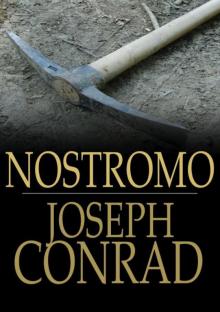 Nostromo
Nostromo Chance: A Tale in Two Parts
Chance: A Tale in Two Parts Youth
Youth Almayer's Folly
Almayer's Folly The Heart of Darkness and the Secret Sharer
The Heart of Darkness and the Secret Sharer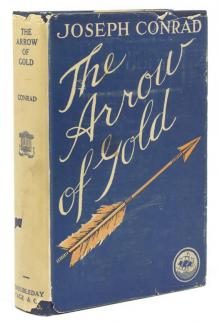 The Arrow of Gold: A Story Between Two Notes
The Arrow of Gold: A Story Between Two Notes The Rescue: A Romance of the Shallows
The Rescue: A Romance of the Shallows The Point Of Honor: A Military Tale
The Point Of Honor: A Military Tale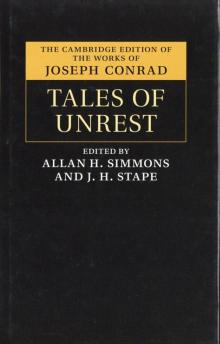 Tales of Unrest
Tales of Unrest Under Western Eyes
Under Western Eyes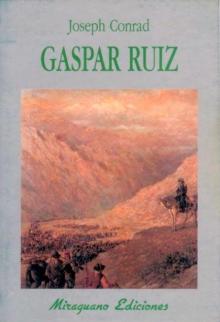 Gaspar Ruiz
Gaspar Ruiz A Set of Six
A Set of Six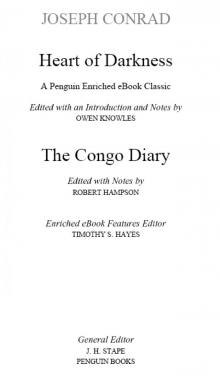 Heart of Darkness and the Congo Diary (Penguin Classics)
Heart of Darkness and the Congo Diary (Penguin Classics) Heart of Darkness and Selected Short Fiction
Heart of Darkness and Selected Short Fiction Typhoon
Typhoon Youth, a Narrative
Youth, a Narrative Tomorrow
Tomorrow The Arrow of Gold
The Arrow of Gold The Shadow Line: A Confession
The Shadow Line: A Confession The Rescue
The Rescue Victory (Echo Library)
Victory (Echo Library) The Brute
The Brute Romance
Romance A Personal Record
A Personal Record Lord Jim: A Tale
Lord Jim: A Tale Heart of Darkness and Selected Short Fiction (Barnes & Noble Classics Series)
Heart of Darkness and Selected Short Fiction (Barnes & Noble Classics Series) Within the Tides
Within the Tides The Secret Sharer and Other Stories
The Secret Sharer and Other Stories Falk
Falk Heart of Darkness and The Secret Sharer
Heart of Darkness and The Secret Sharer Chance
Chance An Anarchist
An Anarchist The Secret Agent: A Simple Tale
The Secret Agent: A Simple Tale The Secret Agent
The Secret Agent Complete Works of Joseph Conrad (Illustrated)
Complete Works of Joseph Conrad (Illustrated)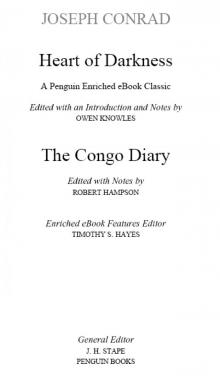 Heart of Darkness and the Congo Diary
Heart of Darkness and the Congo Diary Notes on Life & Letters
Notes on Life & Letters Typhoon (Single Story)
Typhoon (Single Story)